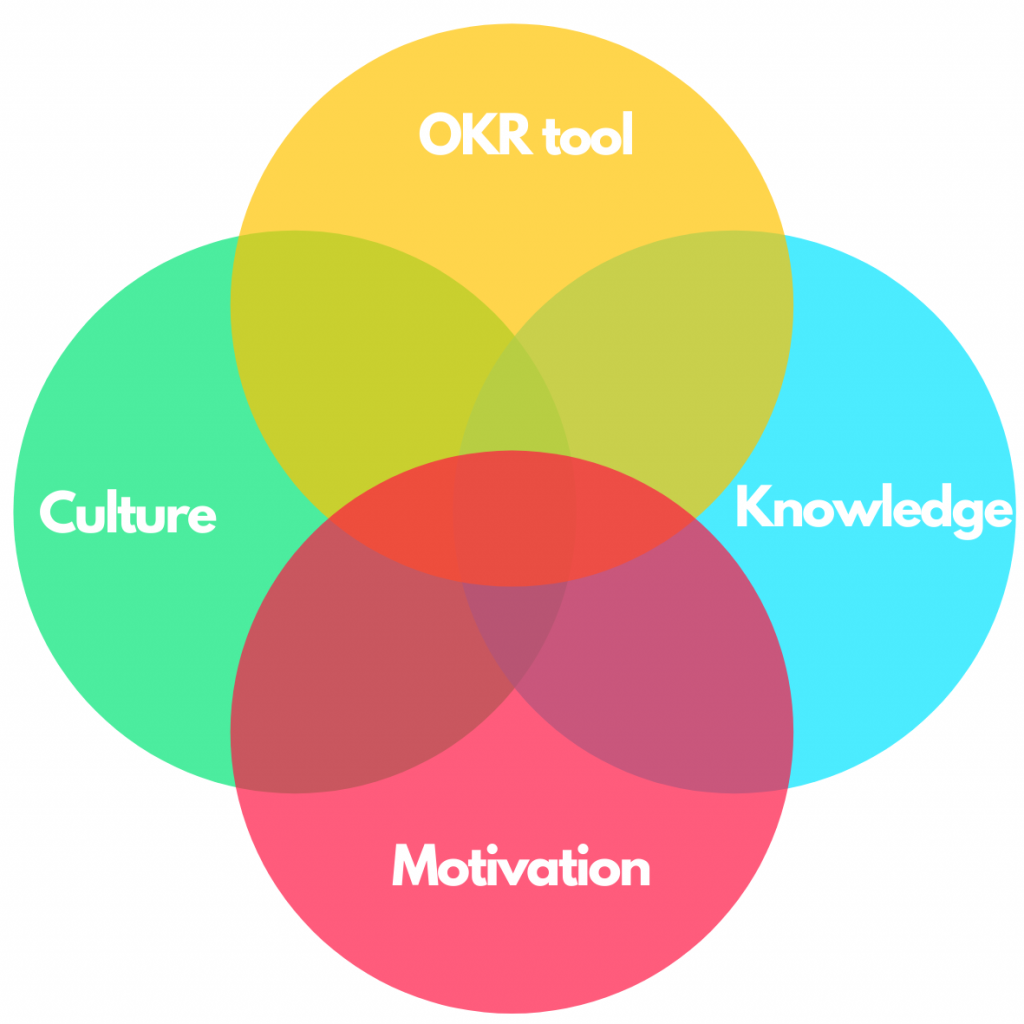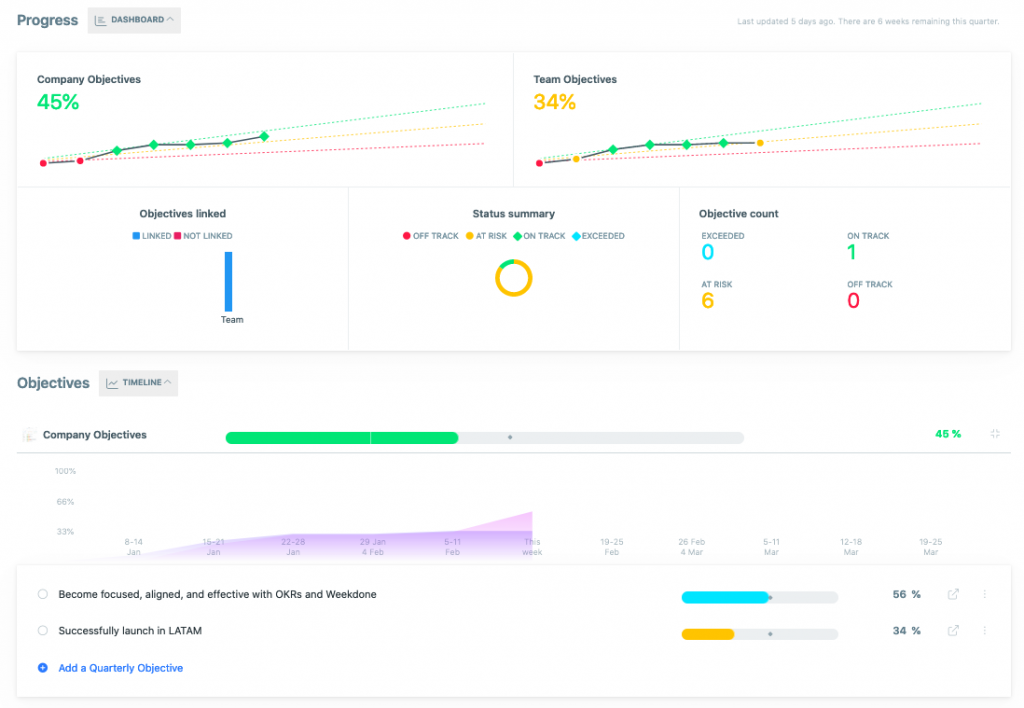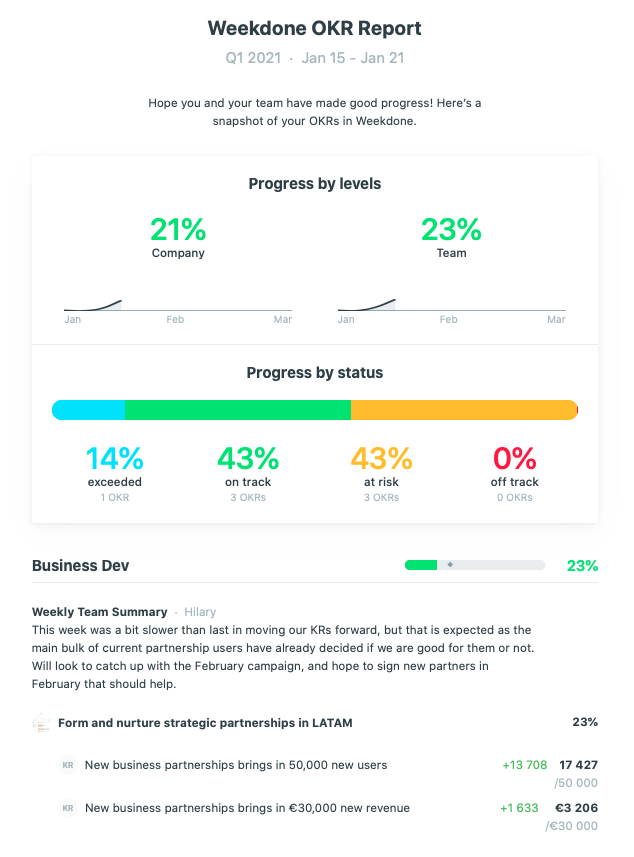Why do Weekdone’s customers have such good success with implementing OKRs? Mirell Põllumäe, one of Weekdone’s OKR coaches, explains the 4 pillar approach Weekdone takes to make sure their clients are ready to implement OKRs.

Are you ready as an organization to implement OKRs? Many organizations want the benefits of OKRs (teaching teams to be result-oriented and having your whole company aligned and moving in the same direction) but OKRs are not a plug and play solution. There are 4 critical components of making OKRs a success – beginning with the implementation stage.

Pillar 1: Knowledge
First of all, OKR knowledge is a must to be able to successfully implement OKRs. Do you understand what the purpose of OKRs is and how to write good OKRs? Do you know the weekly, monthly and quarterly process of OKRs? Can you explain to everyone in the organization their roles in the OKR process?
You need to be able to answer these questions to successfully implement OKRs and get everyone engaged.
A good level of knowledge is needed because OKRs tend to be a bit different from the other methods that companies follow. That means, without knowledge, it is easy to fall for different misconceptions and end up not setting any real OKRs at all. For example, OKRs are really often confused with high-level project management, and instead of defining measurable outcomes, companies are setting action-based outputs as their Key Results. It just defies the whole point of OKRs. Reading just one article is not enough, you need to dig deeper.
Having a process in place is also important. It is very easy to set your OKRs for the quarter and then completely forget about them if you don’t have processes in place. This is why Weekly Check-ins and quarterly reviews are so important to successfully implementing OKRs.
OKR Software and Coaching for Lasting Company Changes

Free for 3 users or 14 day trial for larger teams.
Pillar 2: Motivation
Why are you using OKRs? Are your teams motivated enough to commit to OKRs and the changes needed to make the OKR methodology successful in our organization?
OKRs take an element of drive and commitment to keep them moving when first implementing them. If you have read Measure What Matters, you know it took Google 3-4 quarters to become good at writing OKRs. It takes time, it is a journey. Don’t expect to implement OKRs and in two weeks everything is running perfectly.
You need to have the motivation and the will to train and coach people through this process and manage the overall change that OKRs will bring. The idea of OKRs, they should change the way the organization thinks and the way it works. And that means managing that change over time.
Pillar 3: Culture
When we look at culture in an organization, there are a few elements that are needed when implementing OKRs.
OKRs are supposed to be open and transparent. If your company doesn’t really have that openness and transparency naturally, you have to work towards creating it. The whole purpose of people setting OKRs is to create alignment, which is why OKRs must be visible to everyone. If openness and transparency is new, it will need to be driven and encouraged.
When it comes to OKRs, failing and learning is OK. Every OKR you set won’t be equally successful. Some OKRs might fail. Having that mentality that it is ok to fail and to learn from your failures is important. Even if an OKR doesn’t work out every once in a while, the new knowledge these “failed” OKRs bring can help for future success.
OKRs are measurement driven. So you must have some form of measures in the company. And be prepared for the mind shift from focusing on actions (which is what companies usually do) to focusing on results. People must be ready to trust the outcome and let go of projects that don’t bring measurable results.
Lastly, you need to have trust. As managers, we need to trust teams to develop their OKRs. In the beginning you will coach them on whether they are a fit in the direction we want to go. The aim is to have the teams set good OKRs because they have the skills and expertise in their field to know the best actions the teams can take to help move the Company Objective forward. Management’s role is to make sure everyone goes towards the agreed direction and that team OKRs won’t hurt any other goals or principles that the company has. And as you go on quarter after quarter, it becomes more and more important to give teams that independence to set their OKRs and commit to them.
Pillar 4: An OKR Tool
A tool on its own won’t miraculously help you successfully implement OKRs. You need to also have knowledge, motivation and the right culture in place.
But the right tool can make a difference in these areas. For example, a lot of companies initially start with spreadsheets for measuring OKRs. However, spreadsheets can be really cumbersome, and can quickly deplete motivation to keep OKRs going when you have to force your teams to continuously update spreadsheets.
Spreadsheets also don’t foster the idea of transparency naturally. Sure, you can have a spreadsheet that everyone has access too, but will everyone look at it? And how do you know what plans are driving teams OKRs forward?
Weekdone is more than just OKR software. We provide coaching to all paid clients so that you can get the knowledge needed to successfully implement OKRs for the long term, with individual and team training, and regular OKR quarterly reviews.
Our software allows teams to create habits around their OKRs with the Weekly Check-in process. Each week, teams come up with ways to drive their OKRs forward and enter those plans into Weekdone – plans that are visible to everyone on the platform. If people have issues, or things aren’t moving forward as they should, it is easy for team members to update their plans while keeping everyone in the loop.
Create an OKR habit with Weekdone

Free for 3 users or 14 day trial for larger teams.
What’s Your Company’s Readiness Level?
Without any of the 4 pillars: knowledge, motivation, culture or the right tool, might eventually mean that your company is not successful at implementing OKRs. Not having the knowledge, knowing OKR principles or the processes means you might implement something that actually isn’t OKRs. You can’t get the benefits of using OKR if you are doing something else. Motivation is needed so implementation simply wouldn’t die out and the wrong culture means that the principles and mindset simply can’t be adapted. The good news is that you don’t have to have everything to start with OKRs. If you have the motivation and willingness to learn and change, everything else can come with time.
If you believe that your culture and motivation is in place, but you are looking for the right tool and are lacking in knowledge, Weekdone is the right choice for you. We regularly help clients not only use our tool to measure and track OKRs, but to implement OKRs in a way that works for your company and that will lead to the benefits that OKRs provide.
If you believe you have the knowledge, the motivation and the right tool but there are some elements in your company culture that are missing, you can still implement OKRs. But you need to acknowledge that this cultural change is needed and work towards this cultural change. Some areas, like openness, OKRs will naturally drive people to be more open and a lot more communicative. Communicating regularly with an OKR coach during our training program can help you facilitate this change while using best OKR practices.